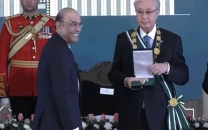Capital punishment: Government not to renew moratorium on executions
Summaries for execution are being forwarded to President Zardari.

Summaries for execution are being forwarded to President Zardari. PHOTO: FILE
“The new government has decided to deal with all cases of execution on merit,” interior ministry spokesperson Umer Hameed told The Express Tribune. “The process of sending summaries [for execution] started today [Thursday].”
The moratorium – introduced under a presidential order in 2008 – was largely kept in place by the previous Pakistan Peoples Party-led regime. However, in November 2012, a soldier convicted by court martial was put to death. Officially, the moratorium on the death penalty expired on June 30.
“We will examine every single case on merit and send five to ten cases to the presidency every day… there will be no general amnesty for convicts waiting for executions,” the spokesperson said.
However, the spokesperson said, this does not mean the government will turn a blind eye to cases which deserve consideration. “The government will show sympathy towards women, children and the elderly,” he maintained.

According to Hameed, the government will follow the recommendations of the home departments of respective provinces regarding each case and act accordingly.
Justifying the government’s decision to not extend the moratorium on executions, the spokesperson said that any individual sentenced to death could challenge the verdict in a superior court, until the case reached the Supreme Court. Even if the SC sentenced a certain individual to death, he or she still has the option to appeal against the decision.
“In light of this, there remains no justification for a pardon,” he maintained.
Hameed also cited a decision of the Lahore High Court regarding the use of article 45 – which grants the president powers to issue a pardon. The court, in its decision, observed that the president should use his statutory powers with ‘due diligence’ and should not use them arbitrarily.
“After keep these things in mind, the government has decided against ‘blanket’ pardons.”
According to the spokesperson, there are currently between 450-500 cases of execution pending with the interior ministry. He maintained, however, that none of those cases were older than 2007.
On the other hand, presidential spokesperson Farhatullah Babar, when contacted, maintained ‘there was no ordinance’ which had stayed executions.
While he claimed that not a single execution, apart from that of a military officer for ‘disciplinary reasons’ on the military’s insistence, was carried out during President Zardari’s tenure, he said “The president never commuted any death sentence to life imprisonment.”
When asked, Babar admitted that there might seem to be a contradiction in President Zardari’s decision to not allow any execution without commuting death sentence.
“This contradiction will disappear, however, when you consider the fact that the president stayed executions based on [then] prime minister Yousaf Raza Gilani’s statement in parliament that the law on death penalty was being reviewed,” he added.
Clarifying the procedure involved in staying executions, the spokesperson said the president directed a stay on a particular execution for three months after receiving the concerned file of the case.
“The last such moratorium expired on June 30.”
Talking about the extending the moratorium, Babar said it depended on the new government. “The president is bound to act upon the advice of the prime minister.”
Meanwhile, he said President Zardari has so far not received any summary for execution.
Amnesty International voices concern
Amnesty International has called for an immediate moratorium on the use of the death penalty. “Any government green light to resume executions in Pakistan would be a shocking and retrograde step, putting thousands of people’s lives at risk,” said Polly Truscott, Amnesty’s deputy Asia Pacific director. Amnesty estimates that Pakistan has more than 8,000 prisoners on death row, most of whom have exhausted the appeals process and could now be facing execution.
“The sheer number of people at risk makes the new government policy of turning back to the death penalty even more horrendous,” said Truscott.
Published in The Express Tribune, July 5th, 2013.



















COMMENTS
Comments are moderated and generally will be posted if they are on-topic and not abusive.
For more information, please see our Comments FAQ